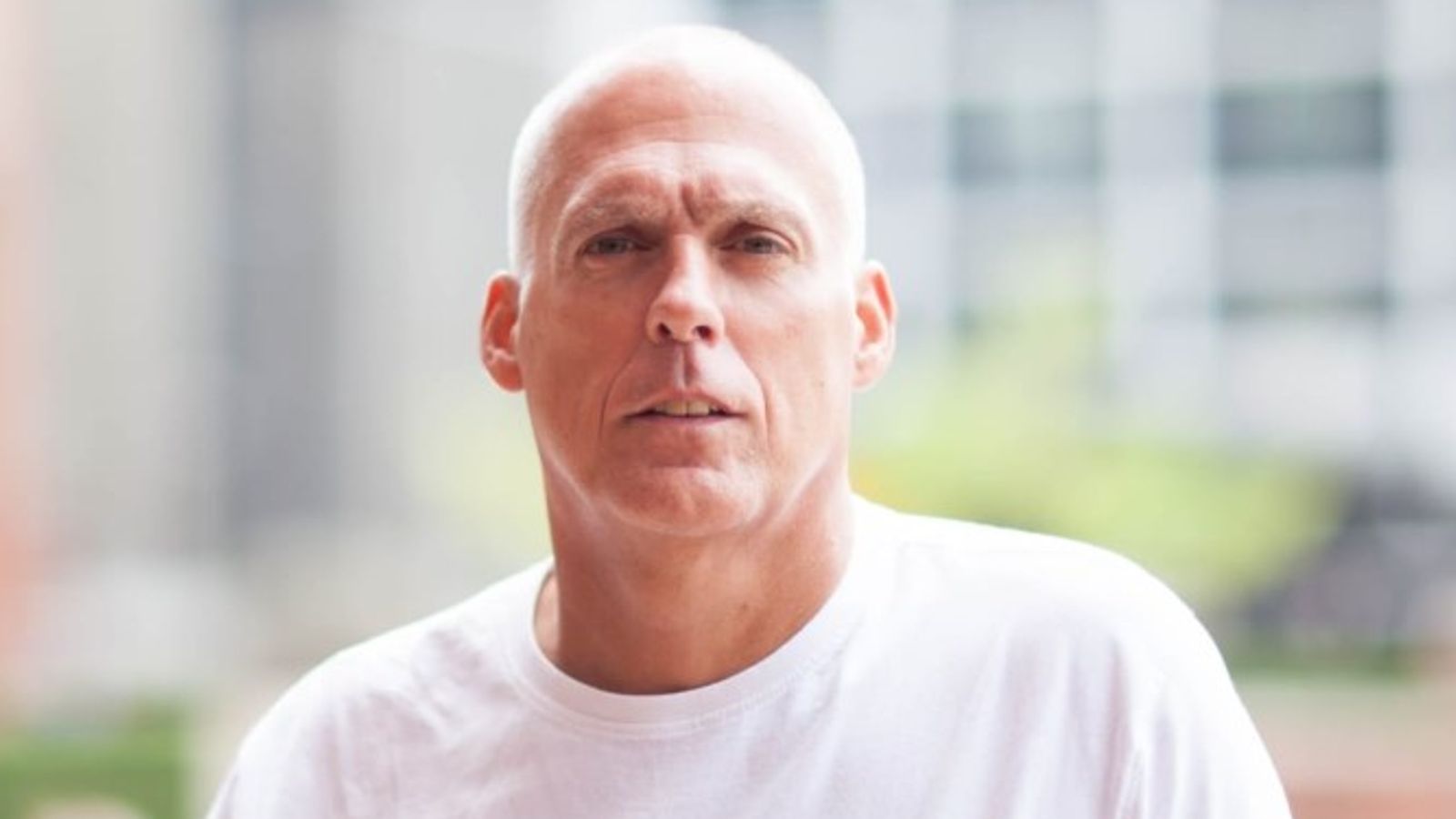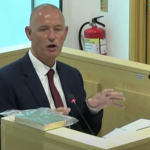It’s nearly 15 years since Terry Ellis pulled off an Ocean’s Eleven-style heist that many in the criminal underworld believed was “an impossible job”.
The daring multimillion-pound raid of telecommunications giant Verizon in north London took four weeks to plan – and most of those involved have never been convicted of the robbery.
“We wanted to do something that took it to a different level – the art of robbery I suppose,” Ellis tells Sky News.
“We didn’t want to hurt anybody. That’s why we didn’t take any guns, any tools, any weapons.
“We didn’t want to be like the normal oik, armed robbers brandishing guns, terrorising people. That’s not what we were about.
“Our game was robbery. We weren’t in the game of hurting people.”
How was the Verizon robbery carried out?
The Metropolitan Police described Ellis as the “lynchpin” of the Verizon raid as he led a gang of robbers posing as police officers into the company’s data centre on 6 December 2007.
Arriving in police-style vehicles and dressed in officers’ uniforms, complete with a dog handler and an Alsatian, the group duped security staff by claiming they were investigating reports of an intruder on the roof.
In fact, the robbers were there to steal hi-tech computer equipment worth £5m.
“It was deemed by most people in the game as an impossible job,” Ellis says.
“Within about a one-mile vicinity of Verizon you had three police stations… so it was a rat-run for the police.
“Anything could have gone wrong so we had to get the timing right.
“We knocked on the door and showed our IDs.
“It was about being so realistic that we could actually get through all the security procedures in place.”
Security staff duped into wearing handcuffs
The building’s security measures included 24-hour patrols, an airlock system on arrival, biometric keypad and card entries, turnstile entrances, CCTV cameras and panic alarms, Ellis says.
“For us, the worst bit was the entry,” he adds.
“The airlock door was like a human trap. If you don’t get through that door, you’re captured.
“We had to be so convincing.”
Once inside, the fake police officers told the building’s staff that the “intruder” was dressed as a security guard so they had to be handcuffed until the culprit was identified.
The robbers then disconnected the building’s CCTV cameras – but that prompted an external security company to call reception to check what was happening.
Ellis says: “I was on reception and just said: ‘We’ve had a surge in the mainframe computer system, our tech guys are on it now and it should be up and running in 20 to 25 minutes.’
“They bought that. That gave us an hour.”
Having arrived at about 9pm, the gang left the building at around 10pm carrying the stolen equipment in laundry bags.
“By the time the penny dropped, we were walking out of there,” Ellis says.
“It was six minutes afterwards, the police arrived.”
How Terry Ellis was caught
Ellis says he feared the gang were “doomed” due to the attention the high-profile robbery attracted.
“I didn’t realise how much s*** would hit the fan,” he adds.
He fled London and ended up living on a canal boat before he was arrested in Luton in September 2008, nine months after the raid.
Ellis received a 10-year prison sentence for the Verizon robbery, along with fellow “main player” Denis Carr, the Met Police said.
At the time, the force said Verizon’s security staff went through “a very traumatic experience” and the sentences “should act as a deterrent to anyone else considering a similar type of venture” – but no one else had been charged over the raid.
Now, despite a film about the heist expected to begin production later this year, Ellis insists he does not want to “glamourise” his criminal past.
“We were just normal guys and our business was crime,” the 57-year-old tells Sky News.
“I do talks in schools and I tell kids they don’t want role models like me or the Krays.
“They want role models who go out to work every day.”
After he was detained over the Verizon robbery, Ellis says a psychologist suggested he consider going to Grendon Prison, in Buckinghamshire, which operates as a “therapeutic community”.
Prison therapy alongside killers and paedophiles
Grendon’s inmates take part in group therapy in a bid to rehabilitate them, they have control over the day-to-day running of their lives, and they can be voted out at any time by their peers.
Ellis says: “At any one time there are only 238 men there. Unfortunately they’re the worst criminals in the system – child killers, serial killers, wife killers, paedophiles, rapists.
“I met some of the most horrendous people who had killed kids. That taught me tolerance.
“It was hell on Earth. I had people who were rapists and paedophiles questioning me as a f****** criminal, questioning my belief system.
“The whole place was a learning place. But I also felt there was a lot of people there who shouldn’t be there, who were using the system.
“They were churning out more proficient predators because they were more aware of their thoughts and feelings and how to act on them, but in a way that they wouldn’t get caught.”
Prison system is ‘failing spectacularly’
Ellis has since written a book about his two-and-a-half years at Grendon Prison called Living Amongst The Beasts.
He believes the recent escape of sex offender Paul Robson, who was missing for five days after fleeing an open prison in Lincolnshire, shows that some inmates are “slipping through the system”.
“This guy jumped through all through the rehabilitation hoops and was deemed a success to leave prison,” he says.
“That’s a failure in itself because the minute he landed in open conditions, he absconded.
“How many sex offenders have pulled the wool over people’s eyes to get to their end?”
Ellis says he believes the prison system is “failing spectacularly”.
“I speak to people in prison. There’s extra bang-ups, so that means more violence,” he says.
“You’ve got people like (Paul Robson) who are slipping through the system.
“They’re overstretched.
“It’s turned into absolute chaos. All it’s about now is survival inside prison and getting through your sentence.”
Leaving prison and rejecting his ‘vices’
Ellis turned his back on crime after leaving prison in 2017 and has since been involved with the campaign group Camden Against Violence and is currently working with his daughter’s custom food delivery business.
The father of five credited his partner Anna, his children and his Christian faith with helping turn his life around.
“I used to drink quite a bit, I used to take drugs, I used to womanise, everything else,” he says.
“I used to crave love because I was abandoned as a kid.
“I never dealt with that so all my life I used to crave as much sex as I could from different partners, enough alcohol and drugs to sink a f****** battleship.
“I was fortunate enough that I had got rid of all my vices (when leaving prison).
“I got rid of alcohol and everything else in my life that could take me down and replaced it with things that would actually improve my life.
“I go running, I go cycling, I go on long walks with my girlfriend and my dogs… not chasing that elusive rainbow that was never going to be there.”






















